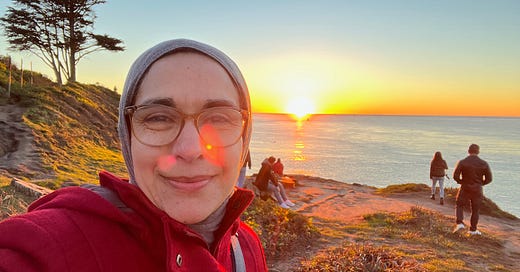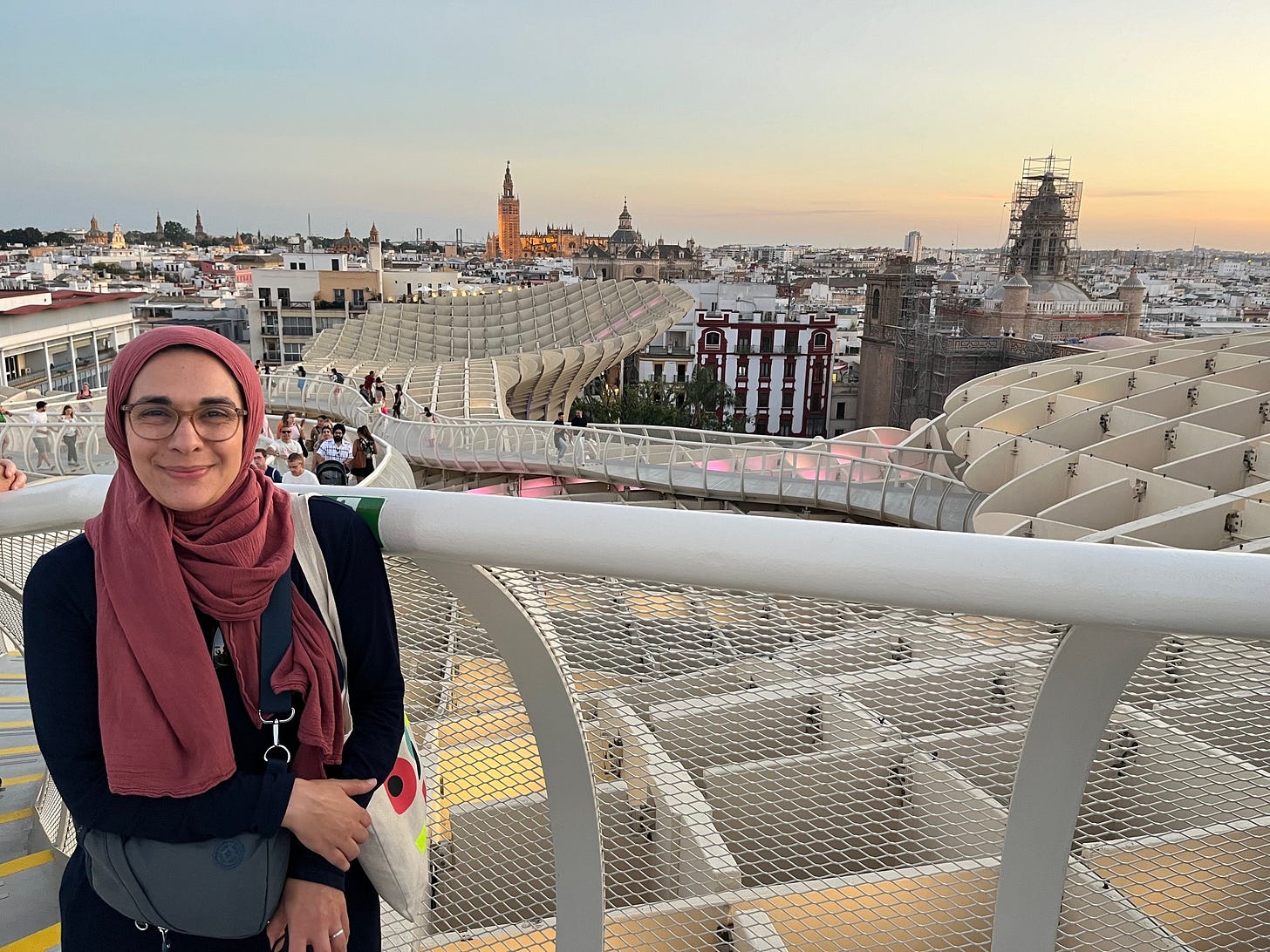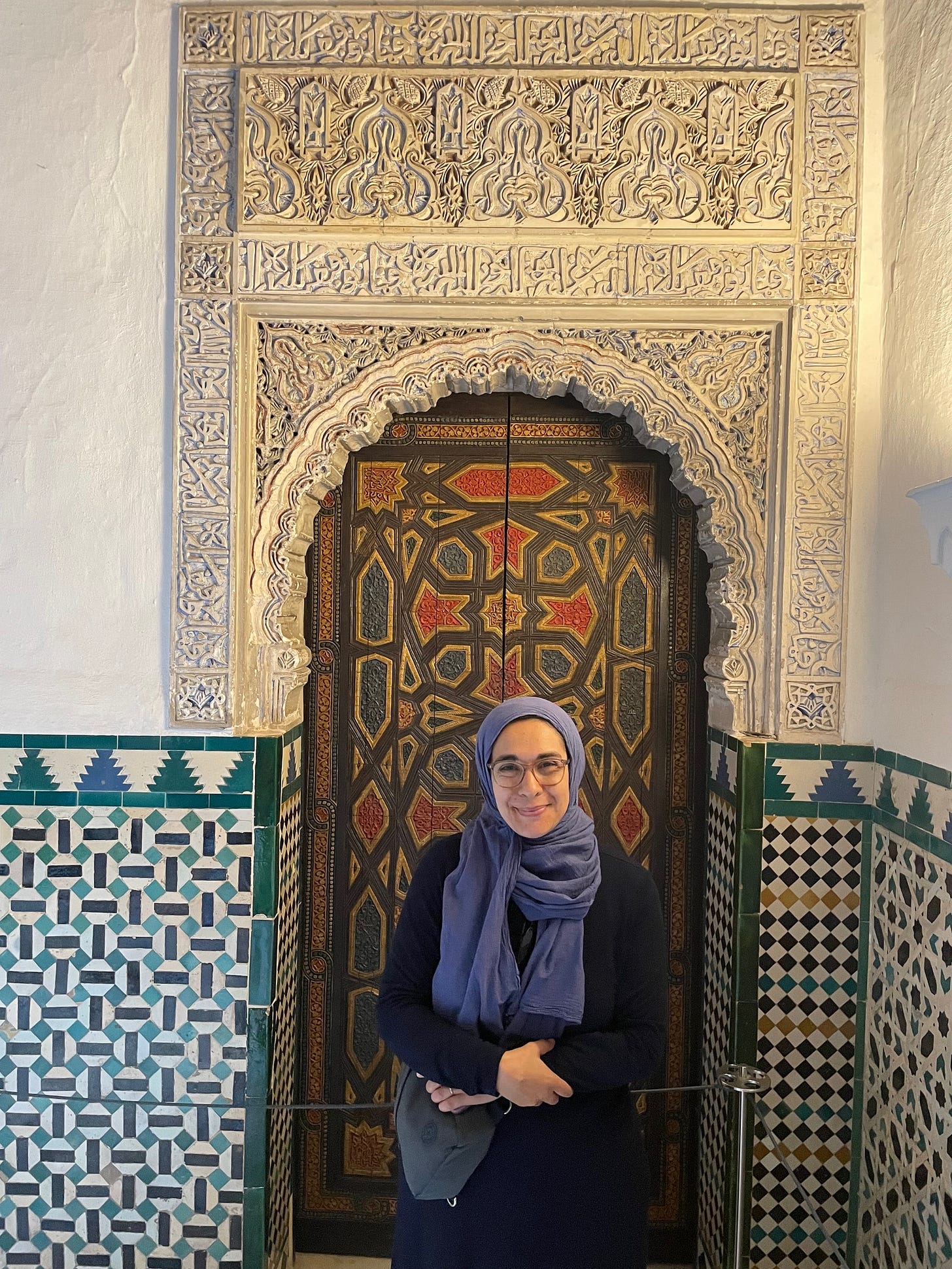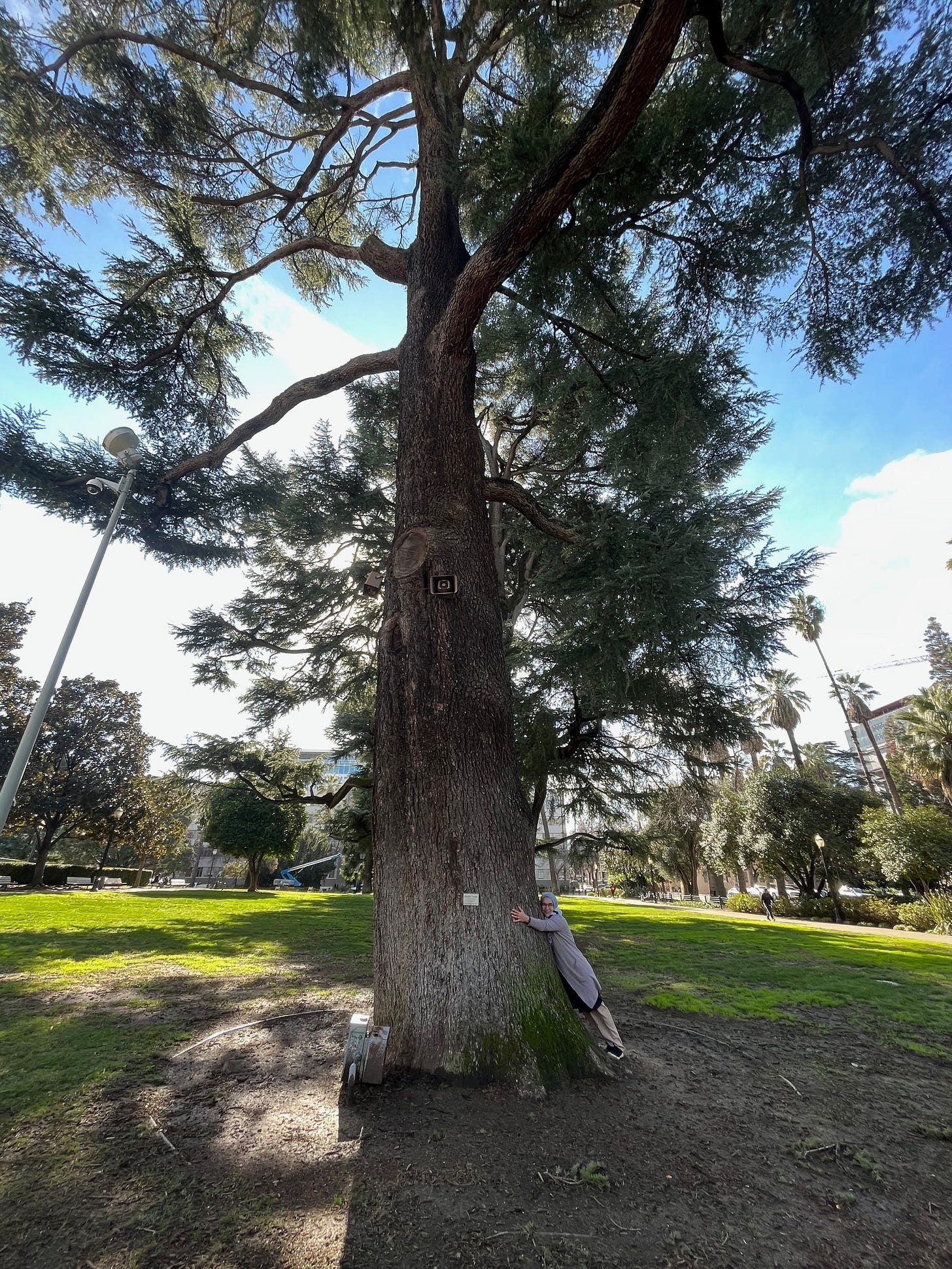Noha Beshir Dreams of Chaos
On making time for creativity, deepening one's faith, and finding community.
Dreams of Chaos is a series of Q&As with folks about how they engage with chaos in their work. Maybe they love the chaos and use it as an engine for creativity. Maybe they struggle with the indefinite and are trying to wrangle it however they can. I’m interested in the ways people acknowledge the messiness of living in the world, and I’m excited to share these conversations with others who have this messiness on their minds.
One of the very best parts of being on Substack is, hands-down, meeting other writers I would never otherwise have met. There are so many folks on here writing stunning pieces of all kinds: memoir, political analysis, reported journalism. You name it, you’ll find it here. It can be hard to keep up with the fantastic work and tell everyone how much I appreciate their writing.
As I wrote when I published this interview with
, it was pure happenstance that connected me with her. And, had I not connected with Heidi, I would never have met the wise and funny person I have the pleasure of sharing with you today.Noha and I were both featured on Heidi’s Mothers Who Make series. The moment I began reading her words I was completely charmed. She manages to bring together a fun-loving cheekiness with a seriousness about things like mental-health, faith, and family. That’s something I strive to do with my writing, too, and I very much admire how Noha succeeds at striking that tricky balance.
We hit it off pretty much right away and began supporting one another’s work. It became apparent pretty quickly that we both have lives imbued with a certain amount of chaos (which we both embrace), that we both love laughing but have soft, big hearts that know how to hurt an awful lot as well. We both feel a deep connection to our faiths. We both sing. We both feel healed by nature.
When I set out to curate this season of the Dreams of Chaos interviews, I knew I wanted to hear Noha’s thoughts on the messy wonder that is life. I hope you love her answers as much as I do.
How would you describe yourself and the work you do?
That used to be a hard question to answer because, for years, I felt very limited by my description of myself, which was that I was a Muslim Canadian. I described myself this as a de facto response, but considered it a very sterile, outward capturing of the things that are easy to notice about me. The funny thing is that I’ve given myself permission over the years to lean into different aspects of my identity (the goody-two-shoes, the singer, the writer, the hockey fan) and see how they fit. And now, in my early 40s I’m a lot more settled with the core of my description being “a Muslim Canadian”.
When I was younger, that felt so bland. Now, I really embrace it as the core of who I am. I think that embracing comes from some spiritual growth I’ve done over the last few years, really interrogating my own relationship with my “Muslimness” and with God, and landing on how I wanted to be Muslim, rather than just mimicking what I was raised with, which was beautiful and open and welcoming, but perhaps fit my parents in their time and place and perception better than it fit me. It’s a Venn diagram with a lot of overlap, but exploring it for myself has been critical with getting comfortable and developing my own way of being.
The best way I can describe my work is that I try to demystify my experiences. Life as a Muslim woman is so over-imbued with meaning and fraught with all these intense misconceptions or generalizations. And there are always experts out there speaking for us. I haven’t found a lot of representation in the media of practicing Muslims. Mostly we’re not there at all, and when we are, we’re either terrorists, oppressed people, devastated refugees, or (and these are the ones that people relate to the most) lapsed, secular Muslims. And I’m not denying that any of those groups of people exist, but I have yet to see someone like myself represented on a TV show or in a movie. Essentially, someone who is part of Western society but is still very much living the tenets of the faith. And that’s wild to me because there are SO MANY of us. I’d go so far as to say we’re the overwhelming majority. But you wouldn’t know it if you hadn’t met us.
Can you share about how your path led you to the work you do today?
I’ve been writing since I was eight years old — poems, songs, stories, etc. I studied at a high school for the arts in the creative writing program, and then I did this very “child of immigrants” thing and took software engineering in university, with the plan that I would write after work. And I did for a little, but then I had kids, and mothering young children was incredibly exhausting, and my writing just totally fell by the wayside. I would try every so often to start back up but I couldn’t find a path or a community, and soon, I’d stop again. There were a few successes on the way (a viral twitter thread that got me into the hockey media space for a while, a memoir piece in a literary journal about life as a hijabi woman in Quebec leading up to their repressive hijab-limiting bill), but it felt very hard to build on.
After a while the guilt was too much and I told myself it just wasn’t the time. Then I promised myself that I’d start again when my youngest was 10. Around the time he turned nine, I found myself mentally feeling creative again, so I started trying to write on my own. But I was like a person in a dark cave, feeling around for my bearings. I’m very community oriented. I’m motivated by being part of a group, and without that I just sort of flail.
So, I joined a creative writing group for Muslim women, and one of the other women there told me to join Substack. I was in the group for three months or so, but it was life changing because it helped me pivot. I’ve found that Substack is an excellent fit for me. I thrive with engagement. My previous attempts at online newsletters felt like I was just shouting into the void, while this is basically an online community for writers. What more could you ask?
Where do you look for inspiration when you’re feeling tapped out?
I read other people’s writing. I’ve been some level of burnt out probably from before the pandemic — this has made reading books very tricky. But shorter writing has been wonderful. I love Brevity Magazine, Literary Mama, and now of course various of my favourite writers are on Substack. I adore
’s work, it’s so moving while still so accessible. is an absolute favourite. I can just start an essay, no matter what it’s about, and meander along until the end knowing I’ll be soothed as I go. speaks to my chronically ill self and I feel seen. And then there’s the brilliant , whose letters to his son are so tender and loving, you just feel cocooned in love as you read them. , who’s part Palestinian and whose writing about identity and family is just so evocative. and write so with such vulnerability about sobriety. I could go on and on. It’s such an embarrassment of riches.I find smart comedies really inspiring too. I’m a deeply silly person in real life, and I appreciate good comedy, whether that’s Trevor Noah or something as ridiculous as the combo of Steve Martin and Martin Short.
Comedy is just so regenerative. Laughing is healing.
Other things I love to do are cycling or skiing along the river path by my home, depending on the season. I love water. It’s so calming and meditative. If my brain is fried or numb, being near the water and listening to Quran or other remembrances of God helps me to feel something again.
What gets you up in the morning?
A good cup of coffee, lol. No but seriously, I mostly struggle with the morning. I care about so many things, but I am a snooze button hitting machine 🙃😅😅
What’s something surprising you’ve done or learned that’s changed how you show up in the world?
I’ve translated for Syrian refugees. We’ve had a steady flow of them to Ottawa since the war, and I’ve been embarrassingly unavailable to truly help, but one thing I can do is offer my services as a translator: At the doctor or dentist, for school calls, other logistics, or even just between the family and their sponsor group.
My observation is that, as a society, we are much less engaged with people of different socio-economic circumstances than we used to be. At least when I was little, and going to public school, I met both people who had a lot and a people who had little. Now, I try to expose my kids to people who have less than them, but not in a gross “let’s pat ourselves on the back for helping the poor” sort of way, and I find there are much fewer organic opportunities. Society is so much more separated.
The refugees I’ve met are not heroes. They are real people who’ve lived through unimaginable pain and difficulty, and shown incredible strength. Because really, what is the alternative? I think we have a habit of treating people living through horrendous difficulty as though they were saints. Maybe because if they’re heroic or incredibly strong, we don’t have to do anything other than give them accolades and marvel at their resilience.
What’s something you wish you could engage in more? Why?
Honestly, it would be writing and community work. There’s a food pantry in my neighbourhood that I’ve been wanting to help at, but I don’t want to show up once just to pat myself on the back. I want to go there and provide support weekly, and I don’t have that time, so I don’t go at all. I also write maybe once a week, and I wish I had a daily writing practice. The hours just are not there.
I also wish I was at my mosque more often. I’m not a regular. My life revolves around my 9:00-5:00 job, the kids’ school and extracurriculars, and supporting my parents when they’re in town. Charity starts at home and these are all worthy causes, but I wish life was more interconnected. Each family unit seems kind of on their own, and the pace of things is so fast that it’s hard to reach beyond your personal needs.
Here at the Chaos Palace, we’re exploring how inviting messiness into our lives can be a vehicle for curiosity and creativity. How does chaos inform what you do, if at all?
Chaos informs my life mainly because I wouldn’t be able to do it all if it wasn’t chaotic. I sometimes see other parents who have an agenda and a calendar with perfectly written, highlighted, colour-coded plans, and I’m like HOW????
I do not know the meaning of tidiness. It’s not in my wheelhouse. Basically, my life is like a conveyor belt of tasks and I feel a little like Lucy from that famous scene in ‘I Love Lucy,’ trying to keep up with the items as they come flying at me.
Things get done because they have to get done by a deadline. Sometimes I’m way ahead of the game, but even when I am, it’s not because of any master organizational strategy. More often than not, I’m working backwards from a week away, and then we’re all flying a bit by the seat of our pants in my household.
For my newsletter, for example, I’ve read all the regular advice: write at the same time every day, have a content calendar, write two or three weeks in advance, etc.
None of that works for me. I basically have a notes file on my phone that’s a running list of potential topics, or lines that can be further explored and fleshed out into ideas. Then on a given week, I take whatever opportunities I can to start writing on one of those topics. Sometimes, the piece comes out nearly fully formed. Other times, I start two or three different pieces before I can find the one that I want to explore or have something to say about.
No matter how much I try to plan ahead, I’m never going to be project-managing my writing. And for me, that makes it more interesting. When I start, I usually don’t know where I’m going to end. I have to write it to get there, and that’s where my most interesting pieces come from.
How does chaos inform your non-work life?
How does it not 🤣🤣? The only place I am truly organized is at my 9:00-5:00
When does messiness feel like it’s too much? What do you do to rein it in when necessary?
If I haven’t slept for multiple days, I start falling apart. And if things are happening on all the fronts at the same time, it catches up to me. Every so often, I need a day where I do absolutely nothing. A lot of vegging. A lot of binging TV shows, or talking for hours on the phone with my sisters, or just spending a long time in bed after I’ve woken up. Basically, the opposite of a productive day. But it recharges me and gets me back on track.
Noha Beshir is a second-generation Muslim Canadian of Egyptian heritage, Ottawa born and raised. She identifies as “A writer, a mother, a wife, a visible minority, and an IT analyst by day, writer by night.” Noha writes , where she shares the joys and challenges of being a visibly Muslim woman from a multi-generational immigrant background. Her writing lies at the intersection of identity, mental health, faith, and motherhood.









